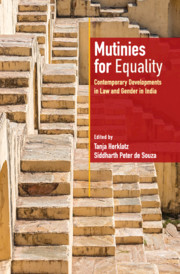Introduction
Published online by Cambridge University Press: 08 June 2021
Summary
Law and Gender in India
The developments in India since the new millennium have shown that the law addressing gender (in)equality is in constant flux. In the last two decades, the Indian parliament has passed key legislation on domestic violence, sexual harassment in the workplace, maternity benefits, surrogacy and HIV/Aids prevention, and brought about reforms to the criminal provisions regarding sexual violence, criminal procedural law and religion-based family laws, addressing matters related to divorce and inheritance. The Indian Supreme Court has delivered landmark judgments dealing with online sexual harassment, acid attacks against women and abortion rights. It has banned the practice of Muslim divorce by triple talaq, decriminalised consensual sexual intercourse between adult men, strengthened the rights of transgender people, decriminalised adultery, granted women a right to enter the Sabarimala temple and given women equal rights in the army.
In India, like elsewhere, the drivers of legal change often emerge from beyond the traditional institutions of law-making and jurisprudence, that is, the parliaments and the courts. Over the past decades, multiple state and non-state actors have pushed for change or pushed back against it and thereby shaped the outcomes of legal reform processes. These actors include not only state organs such as the Law Commission of India and the National Commission for Women, non-state fora like nari adalats (women's courts), khap panchayats (community courts) and sharia courts and civil society actors such as women's non-governmental organisations (NGOs) and LGBTIQ groups, but also religious groups, nationalist organisations and men's rights groups, and individuals like cause lawyers, petitioners, writers, bloggers, journalists, scholars and activists.
This book engages with recent developments in the area of law and gender in India. Our focus lies in addressing the idea of (in)equality and, with it, related questions of opportunities, access, representation and freedom. We seek to elaborate where systems of inequality persist in Indian society and its laws and how these sustain hierarchies of power. We look at landmark moments of legal change and portray how, through different battles for equality, these structures of inequality are challenged by various actors, who push for grand law reforms. And we assess how legal changes translate into social change and how closely they are related to the everyday struggles that individuals seek when realising equality on the ground.
- Type
- Chapter
- Information
- Mutinies for EqualityContemporary Developments in Law and Gender in India, pp. 1 - 18Publisher: Cambridge University PressPrint publication year: 2021

